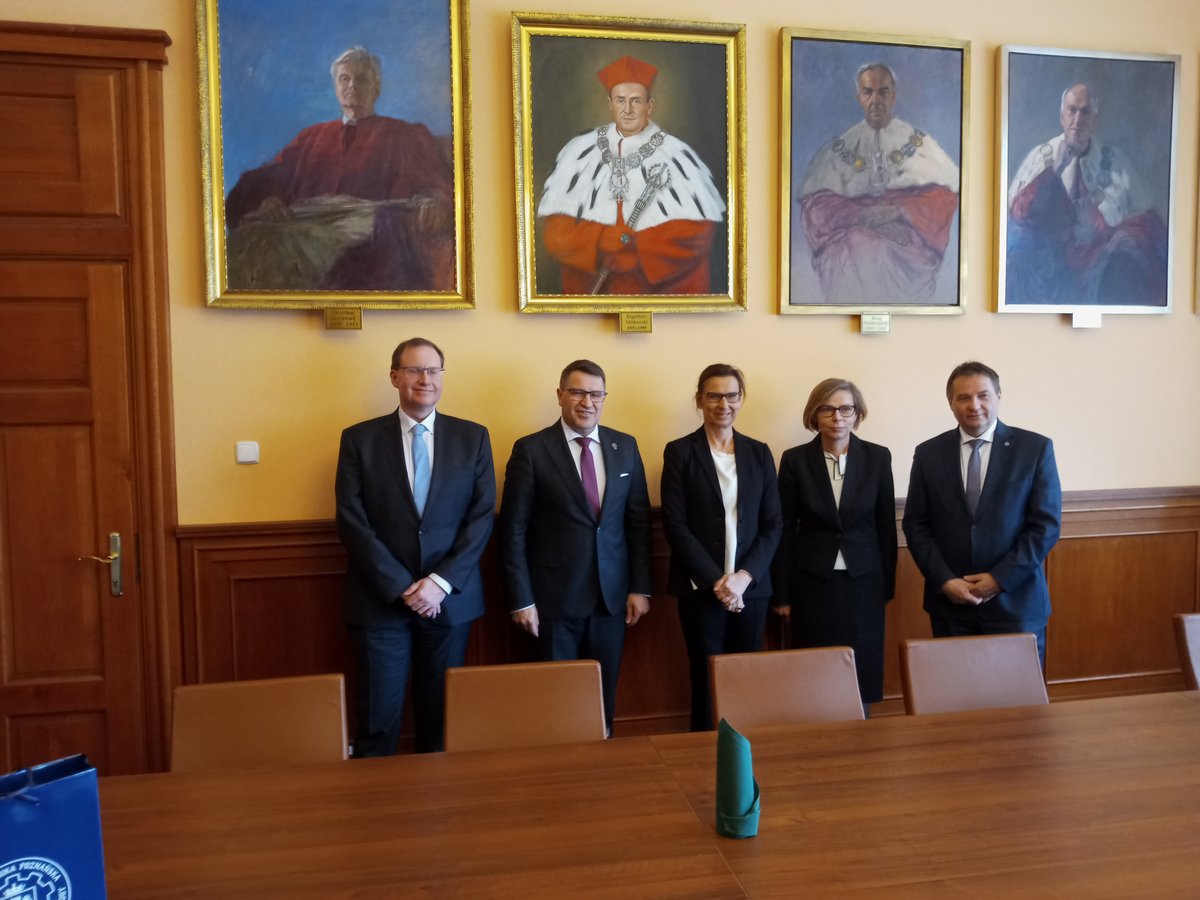BTU delegation visits EUNICE partner university in Poznań
The BTU has been cooperating with the Poznań University of Technology in Poland for 30 years. Most recently, the cooperation was intensified by the joint project EUNICE, the European University for Customised Education.
Last week, a delegation from BTU Cottbus-Senftenberg headed by Prof. Dr Gesine Grande travelled to Poznań to exchange views with the university management there – represented by the Rector Professor Teofil Jesionowski, the Vice-Rector for International Relations Professor Paweł Śniatała and the Director of the PUT Doctoral School Professor Alina Dudkowiak – on cooperation opportunities in the area of doctoral programmes and activities to implement EUNICE.
Further ongoing research activities include the EU projects SMART4All, an extensive network of digital innovation hubs for boosting technology and business development in South, Eastern and Central Europe,REUNICE, Research with and for society in EUNICE and the ERASMUS+ project CYBERFIT, a program which aims to train students and scholars in Cybersecurity, preparing them for the challenges of information and communication technologies in research and studies for internationalization.
Both universities appreciate the long-standing, excellent cooperation and emphasised the importance of this partnership for each other. EUNICE in particular is of great strategic importance for the BTU and the PUT, as the project offers enormous potential for further joint projects in study, teaching and research. To this end, the faculties and departments are to be even more closely involved.
In addition, the participants exchanged ideas on joint doctoral training. Specific questions about suitable topics and subject areas, possible scholarships, joint announcement and application procedures as well as other organisational processes are to be discussed in a follow-up meeting at the BTU at the end of April.
It was the first visit by BTU President Prof. Dr. Gesine Grande since she took office. This trip was embedded in the Colloqium of Applied Mechanics – Materials, Design and Biomedical Engineering organised by Prof. Dr.-Ing. Matthias Ziegenhorn from the Chair of Engineering Mechanics and Machine Dynamics: “With the presidents' meeting and the colloquium we have reached a further important milestone on the way to a joint doctoral college.”
Other participants from the German university were Vice President Prof. Dr. Michael Hübner, EUNICE Project Manager Prof. Dr. Christiane Hipp and Michael Mannel from the International Relations Office.
In addition to the constructive discussions, the German delegation had the opportunity to visit the modern and excellently equipped teaching and laboratory buildings on the PUT campus during a guided tour.
"The colloquium was a wonderful opportunity to showcase our fields of interest and to further our connections, to meet us, where we are and to talk about where we can go from here. Designed as a follow-up to a similar event in Senftenberg, this colloquium aimed to give our joint PhD students the opportunity to present their work in the presence of their supervisors, giving us a unique insight into their research. I hope that this meeting will provide the path for a joint graduate school. In the last 30 years our cooperation has brought us together. And I am absolutely convinced that this will continue to do so, it will grow from here. I am very much looking forward to taking it to the next level," sums up BTU President Prof. Dr. Gesine Grande.
Background EUNICE
The BTU forms the alliance EUNICE (European UNIversity for Customised Education) with the University of Cantabria, the University of Catania, the University of Mons, the Université Polytechnique Hauts-de-France, the University of Vaasa and the Poznań University of Technology. What all the partner universities have in common is that they tend to be located away from the urban centres of their respective countries. As a result, they have similar problems in recruiting students and staff.
EUNICE aims to solve social and economic problems - both globally and locally. With a clear vision for the future, the alliance strives to achieve multiple goals: In addition to customised and flexible education, the shaping of a European identity and close cooperation with the regional economy are of great importance to the consortium. As a European University, the Alliance is funded by the EU and receives up to €5 million from the Erasmus+ programme and up to €2 million from the Horizon 2020 programme for a period of three years to implement the plans.

